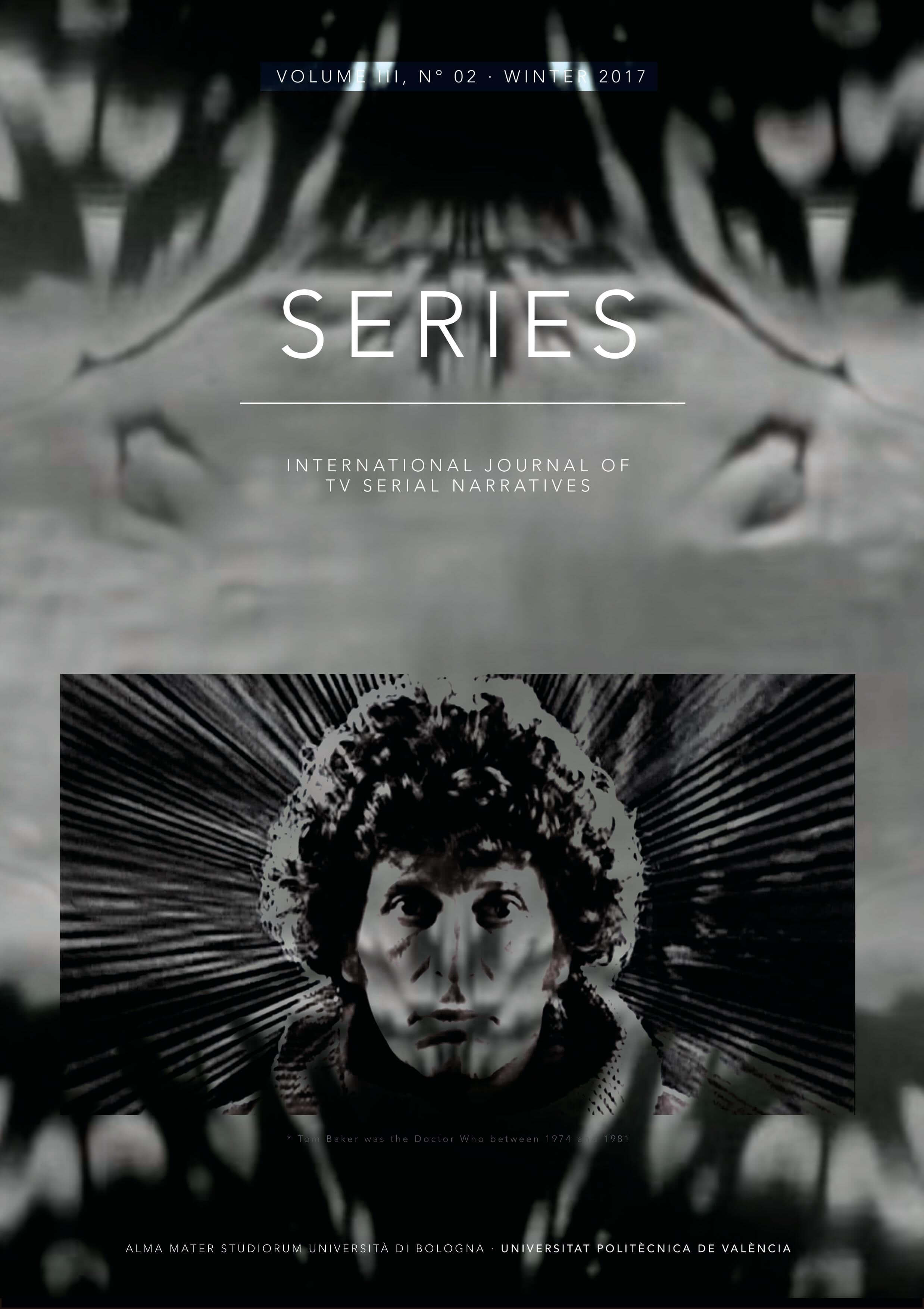Deconstructing Clara Who. A Female Doctor Made Possible by an Impossible Girl
DOI:
https://doi.org/10.6092/issn.2421-454X/7627Parole chiave:
Doctor Who, companion, Clara Oswald, self-reflexive feminist critiques, televisionAbstract
This paper explores the ways in which the role of the Doctor Who companion has been historically shaped by precedents that dictate the ways that female characters function within the narrative, and how these traits were self-reflexively critiqued by recent companion Clara Oswald. The companion is traditionally relegated to the role of a sidekick, with normative ideals perpetuated by the serial nature of the long-running series. These dictate the characterization of the companion, along with the expression of their sexuality and agency, thus restrictively defining the exclusive space in which female characters are allowed to occupy within Doctor Who. Where other characters had been unsuccessful, Clara succeeds in challenging this role by operating within the hegemonies of the companion narrative to deconstruct them, claiming agency where other companions were unable to, and departing the show having essentially become the Doctor herself – paving the way for the casting of Jodie Whittaker as the first female incarnation of the Time Lord.Riferimenti bibliografici
Amy-Chinn, Dee (2008). “Rose Tyler: The ethics of care and the limit of agency.” Science Fiction Film & Television 1(2): 231-47. DOI: https://doi.org/10.3828/sfftv.1.2.3.
Amy-Chinn, Dee (2014). “Amy’s Boys, River’s Man: Generation, Gender, and Sexuality in the Moffat Whoniverse.” In Doctor Who The Eleventh Hour: A Critical Celebration of the Matt Smith and Steven Moffat Era, edited by Andrew O’Day, 70-86. London: I.B. Tauris & Co Ltd.
Booth, Paul. (2014) “Periodising Doctor Who.” Science Fiction Film & Television 8(2): 7(2): 195-215 DOI: http://muse.jhu.edu/article/547295.
Britton, Piers D. (2011). TARDISbound: navigating the universes of Doctor Who. London: I.B. Tauris.
Burrows, Karen K. (2015). “Stories and Fairytales: Feminism, Agency and Narrative Control with the Pond Family Women.” In Companion Piece: women celebrate the humans, aliens and tin dogs of Doctor Who, edited by L.M. Myles and Liz Barr, 119-31. Des Moines, IA: Mad Norwegian Press.
Campbell, Mark (2010). Doctor Who: the episode guide. Harpenden: Pocket Essentials.
Chapman, James. (2013) Inside the TARDIS: the worlds of Doctor Who: a cultural history. London: I B Taurus.
Davies, Russell T. and Benjamin Cook (2010). Doctor Who, The Writers Tale: The Final Chapter: The Definitive Story of the BBC Series. London: BBC.
Dodson, Linnea (2015). “From ‘There’s Nothing Only About Being a Girl’ to ‘The Most Important Woman in the Whole of Creation’: Feminism and the Female Companions.” In Companion Piece: women celebrate the humans, aliens and tin dogs of Doctor Who, edited by L.M. Myles and Liz Barr, 119-31. Des Moines, IA: Mad Norwegian Press.
Erens, Patricia ed. (1990). Issues in Feminist Film Criticism. Bloomington: Indiana U Press.
Fiske, John (2011). Television Culture. London: Routledge.
Gill, Rosalind (2007). “Postfeminist Media Culture: Elements of a Sensibility.” European Journal of Cultural Studies 10(2): 147-66. DOI: http://journals.sagepub.com/doi/abs/10.1177/1367549407075898
Halberstam, Jack (2011). Queer Art of Failure. Durham: Duke University Press.
Hamad Hannah (2015). “‘I’m Not Past My Sell By Date Yet!’: Sarah Jane’s Adventures in Postfeminist Rejuvenation and the Later-Life Celebrity of Elisabeth Sladen.” In Women, Celebrity and Cultures of Ageing, edited by Deborah Jermyn and Susan Holmes, 162-77 . London: Palgrave Macmillan.
Hills, Matt (2010). Triumph of a time lord: regenerating Doctor Who in the twenty-First century. London: I.B. Tauris.
Hills, Matt (2013). New dimensions of Doctor Who: adventures in space, time and television. London: I.B.Tauris.
Johnson, Catherine (2013). “Doctor Who as a Programme Brand.” In New Dimensions of Doctor Who: Adventures in Space, Time, and Television, edited by Matt Hills, 95-112. London: I.B. Tauris.
Johnston, Connor (2014). “'Doctor Who' or 'Clara Who?'.” Doctor Who TV, 15 December 2014, www.doctorwhotv.co.uk/doctor-who-or-clara-who-67831.htm(last accessed 11-11-17).
Jowett, Lorna. “The Girls Who Waited? Female Companions and Gender in Doctor Who.” Critical Studies in Television: The International Journal of Television Studies 9(1): 77–94.
Jowett, Lorna. Dancing with the doctor: dimensions of gender in the Doctor Who universe. I.B. Tauris, 2017.
Lyon, J. S (2005) Back to the Vortex: The Unofficial and Unauthorised Guide to Doctor Who 2005. Surrey: Telos Publishing.
Marcus, Laurence and Stephen R. Hulse. “Biography: Sydney Newman.” SYDNEY NEWMAN | A TELEVISION HEAVEN BIOGRAPHY. N.p., n.d. Web: http://www.televisionheaven.co.uk/sydney_newman.htm (last accessed 11-11-2017).
Mulvey, Laura (1990). “Visual Pleasure and Narrative Cinema.” In Issues in Feminist Film Criticism, edited by Patricia Erens. Bloomington: Indiana University Press. 28-40.
Myles, L. M. and Liz Barr ed (2015). Companion Piece: women celebrate the humans, aliens and tin dogs of Doctor Who. Des Moines, IA: Mad Norwegian Press.
Nathan-Turner, John (1986). Doctor Who: The Companions. New York: Random House.
O’Neill, P. (1983). “Elisabeth Sladen Returns to the TARDIS.” Starlog 6(7):28-9.
Öztanyel, Alya (2016). “Doctor Who or Clara Who?? // Problem of the last two seasons.” www.youtube.com/watch?v=k-ElZD2ZyF4 (last accessed 10-11-17).
Simone, Gail (1999). “Women in Refrigerators.” www.lby3.com/wir/ (last accessed 30-07-17).
Smith, Caitlin, and Defne Sastim, eds. (2015). 101 Claras to See. Welland: Bowden Printing.
Smith, Caitlin (2015a). “Masked.”In 101 Claras to See, edited by Caitlin Smith and Dafne Sastim, 13. Welland: Bowden Printing.
Smith, Caitlin (2015b). “Unconscious.” In 101 Claras to See, , edited by Caitlin Smith and Dafne Sastim, 66. Welland: Bowden Printing.
There’s Something About Mary… Documentary (2009). Prod. Richard Molesworth, Dan Hall. In The Power of Kroll – Special Edition. 2|entertain. DVD.
Tulloch, John, and Manuel Alvarado (1983). Doctor Who: The Unfolding Text. Houndmills: Macmillan.
TV Series and Films cited
Doctor Who (1963-1989), (2005-)
Ghostbusters (2016)
Johnny Guitar (1954)
Riddles of the Sphinx (1977)
Star Trek (1966-1969)
Steven Universe (2012-)
Downloads
Pubblicato
Come citare
Fascicolo
Sezione
Licenza
Copyright (c) 2017 Jared Aronoff
La rivista è rilasciata sotto una licenza Creative Commons Attribuzione 4.0 Internazionale (licenza completa).
Vedere anche la nostra Open Access Policy.





